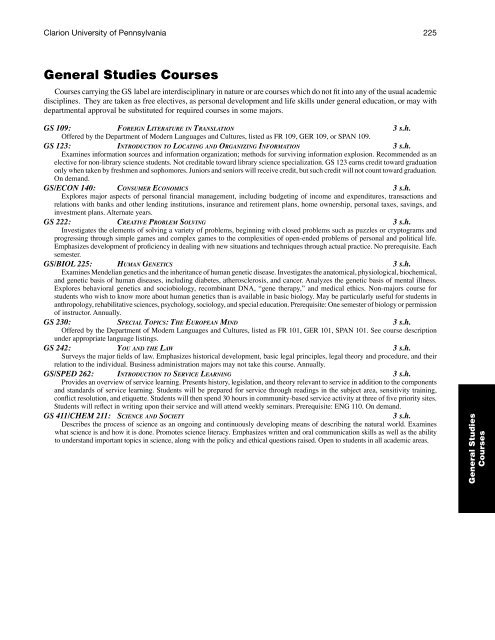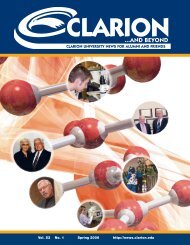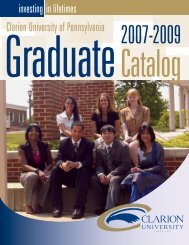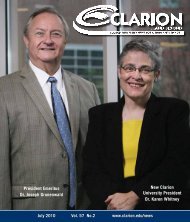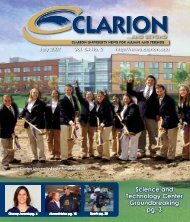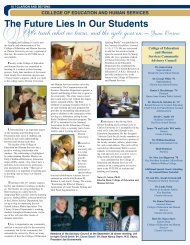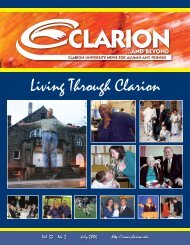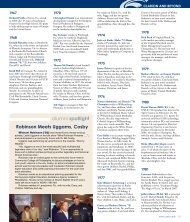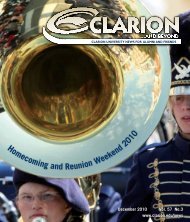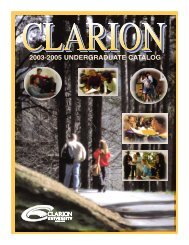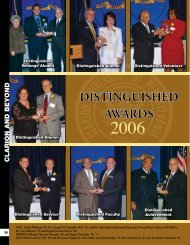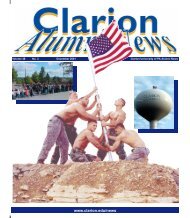Undergraduate - Clarion University
Undergraduate - Clarion University
Undergraduate - Clarion University
- No tags were found...
Create successful ePaper yourself
Turn your PDF publications into a flip-book with our unique Google optimized e-Paper software.
<strong>Clarion</strong> <strong>University</strong> of Pennsylvania 225General Studies CoursesCourses carrying the GS label are interdisciplinary in nature or are courses which do not fit into any of the usual academicdisciplines. They are taken as free electives, as personal development and life skills under general education, or may withdepartmental approval be substituted for required courses in some majors.GS 109: Foreign Literature in Translation 3 s.h.Offered by the Department of Modern Languages and Cultures, listed as FR 109, GER 109, or SPAN 109.GS 123: Introduction to Locating and Organizing Information 3 s.h.Examines information sources and information organization; methods for surviving information explosion. Recommended as anelective for non-library science students. Not creditable toward library science specialization. GS 123 earns credit toward graduationonly when taken by freshmen and sophomores. Juniors and seniors will receive credit, but such credit will not count toward graduation.On demand.GS/ECON 140: Consumer Economics 3 s.h.Explores major aspects of personal financial management, including budgeting of income and expenditures, transactions andrelations with banks and other lending institutions, insurance and retirement plans, home ownership, personal taxes, savings, andinvestment plans. Alternate years.GS 222: Creative Problem Solving 3 s.h.Investigates the elements of solving a variety of problems, beginning with closed problems such as puzzles or cryptograms andprogressing through simple games and complex games to the complexities of open-ended problems of personal and political life.Emphasizes development of proficiency in dealing with new situations and techniques through actual practice. No prerequisite. Eachsemester.GS/BIOL 225: Human Genetics 3 s.h.Examines Mendelian genetics and the inheritance of human genetic disease. Investigates the anatomical, physiological, biochemical,and genetic basis of human diseases, including diabetes, atherosclerosis, and cancer. Analyzes the genetic basis of mental illness.Explores behavioral genetics and sociobiology, recombinant DNA, “gene therapy,” and medical ethics. Non-majors course forstudents who wish to know more about human genetics than is available in basic biology. May be particularly useful for students inanthropology, rehabilitative sciences, psychology, sociology, and special education. Prerequisite: One semester of biology or permissionof instructor. Annually.GS 230: Special Topics: The European Mind 3 s.h.Offered by the Department of Modern Languages and Cultures, listed as FR 101, GER 101, SPAN 101. See course descriptionunder appropriate language listings.GS 242: You and the Law 3 s.h.Surveys the major fields of law. Emphasizes historical development, basic legal principles, legal theory and procedure, and theirrelation to the individual. Business administration majors may not take this course. Annually.GS/SPED 262: Introduction to Service Learning 3 s.h.Provides an overview of service learning. Presents history, legislation, and theory relevant to service in addition to the componentsand standards of service learning. Students will be prepared for service through readings in the subject area, sensitivity training,conflict resolution, and etiquette. Students will then spend 30 hours in community-based service activity at three of five priority sites.Students will reflect in writing upon their service and will attend weekly seminars. Prerequisite: ENG 110. On demand.GS 411/CHEM 211: Science and Society3 s.h.Describes the process of science as an ongoing and continuously developing means of describing the natural world. Examineswhat science is and how it is done. Promotes science literacy. Emphasizes written and oral communication skills as well as the abilityto understand important topics in science, along with the policy and ethical questions raised. Open to students in all academic areas.pages i-viiGeneral StudiesCourses


